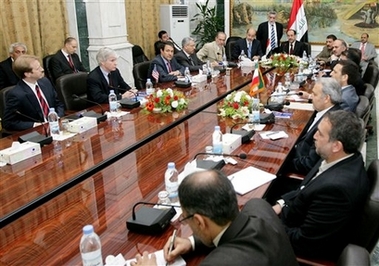Middle East
US, Iran return to public diplomacy
(AP)
Updated: 2007-05-28 14:09
 |
Large Medium Small |
BAGHDAD - Iran and the United States resume public diplomacy Monday for the first time in more than a quarter century. The meeting in Baghdad between ambassadors on security in Iraq could produce a chapter in world history for its success or a footnote for its failure.
"There are good intentions and understanding and commitment between the two countries," Ali al-Dabagh, an Iraqi government spokesman, told reporters.
The talks were held at Iraqi Prime Minister Nouri al-Maliki's office in the Green Zone compound in Baghdad. Iraq was being represented at the talks by National Security Adviser Mowaffak al-Rubaie.
Just before 10:30 a.m., al-Maliki greeted the two ambassadors, who shook hands, and led them into a conference room, where the ambassadors sat across the table from each other. Al-Maliki then made a brief statement and left the room.
He told both sides that Iraqis want a stable country free of foreign forces and regional interference. The country should not be turned into a base for terrorist groups, he said. He also said that the US-led forces in Iraq were only here to help build up the army and police and the country would not be used as a launching ground for a US attack on a neighbor, a clear reference to Iran.
"We are sure that securing progress in this meeting would, without doubt, enhance the bridges of trust between the two countries and create a positive atmosphere" that would help them deal with other issues, he said.
Speaking in Tehran, Iranian Foreign Minister Manouchehr Mottaki said Monday the talks could lead to future meetings, but only if Washington acknowledges that its Middle East policy has not been successful.
"We are hopeful that Washington's realistic approach to the current issues of Iraq by confessing its failed policy in Iraq and the region and by showing a determination to changing the policy guarantees success of the talks and possible further talks," Mottaki said.
Monday's talks were to have a pinpoint focus: What Washington and Tehran - separately or together - could do to contain the sectarian conflagration in Iraq.
Washington wants Tehran to stop arming, financing and training militants, particularly Shiite militias that are fighting American and Iraqi troops. Tehran wants Washington out of Iraq, period.
"The American side has accusations against Iran and the Iranian side has some remarks on the presence of the American forces on Iraqi lands, which they see as a threat to their government," al-Dabagh said in a briefing to reporters during the closed-door meeting.
But much more encumbers the narrow agenda, primarily Iran's nuclear program and more than a quarter-century of diplomatic estrangement after the 1979 Islamic revolution in Iran.
Washington and its Sunni Arab allies, on their side, are deeply unnerved by growing Iranian influence in the Middle East and the spread of increasingly radical Islam.
Compounding all that is Iran's open hostility to Israel.
Those issues, combined, are what make this opening of the US-Iranian minuet both so important and so interesting.
Will this first meeting, as the Iraqis openly hope and as the Iranians and Americans may quietly aspire, be sufficiently cordial and productive that a second meeting becomes possible? Should that happen, will a future dialogue involve higher-level officials - perhaps Secretary of State Condoleezza Rice and Iran's foreign minister?
| 分享按钮 |

